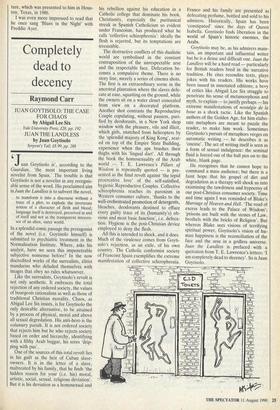Completely dead to decency
Raymond Carr
JUAN GOYTISOLO: THE CASE FOR CHAOS by Abigail Lee Six
Yale University Press, £20, pp. 192
JUAN THE LANDLESS by Juan Goytisolo
Serpent's Tail, £8.99, pp. 288 uan Goytisolo is', according to the
Guardian, 'the most important living
novelist from Spain.' The trouble is that Goytisolo is not a novelist in any recognis- able sense of the word. His proclaimed aim
in Juan the Landless is to subvert the novel, to transform it into a discourse without a trace of a plot; to explode the inveterate notion of a character of flesh and blood; language itself is destroyed, perceived in and of itself and not as the transparent interces- sor of an alien, outer world.
In a splendid comic passage the protagonist of the novel (i.e. Goytisolo himself) is submitted to psychiatric treatment in the Normalisation Institute. Where, asks his analyst, have we seen this impenetrable subjective nonsense before? In the now discredited works of the surrealists, elitist mandarins who deluded themselves with images that obey no rules whatsoever.
Like the surrealists, Goytisolo's revolt is not only aesthetic. It embraces the total rejection of any ordered society, the values of bourgeois rationalism as well as those of traditional Christian morality. Chaos, as Abigail Lee Six insists, is for Goytisolo the only desirable alternative, to be, attained by a process of physical, moral and above all sexual degredation. His anti-hero is the voluntary pariah. It is not ordered society that rejects him but he who rejects society based on order and hierarchy, identifying with a filthy Arab beggar, his sores 'drip- ping with pus'.
One of the sources of this total revolt lies in his guilt as the heir of Cuban slave- owners. It is in the letter of a slave, maltreated by his family, that he finds 'the hidden reason for your (i.e. his) moral, artistic, social, sexual, religious deviation'. But it is his deviation as a homosexual and his rebellion against his education in a Catholic college that dominate his book. Christianity, especially the puritanical streak in Spanish Catholicism so evident under Francoism, has produced what he calls 'collective schizophrenia': ideally the flesh is rejected, but its temptations are irresistible.
The destructive conflicts of this dualistic world are symbolised in the constant contraposition of the unrespectable arse and the respectable face. Defecation be- comes a compulsive theme. There is no story line; merely a series of cinema shots. The first is an extraordinary scene in the ancestral plantation where the slaves defe- cate at ease, squatting on the ground, while the owners sit on a water closet concealed from view on a decorated platform. Another shot contrasts the Reproductive Couple copulating, without passion, puri- fied by deodorants, in a New York shop window with the pleasure, vile and illicit, which girls, snatched from helicopters by the 'splendid majesty of King Kong', seat- ed on top of the Empire State Building, experience when the ape brushes their thighs with his 'lingual dart'. All through the book the homosexuality of the Arab world — T. E. Lawrence's Pillars of Wisdom is repeatedly quoted — is pre- sented as the final revolt against 'the tepid procreative love' of the self-satisfied, hygienic Reproductive Couples. Collective schizophrenia reaches its paroxism in Western consumer culture, 'thanks to the well-orchestrated promotion of detergents, bleaches, deodorants destined to efface every guilty trace of its (humanity's) ob- vious and most basic function', i.e. defeca- tion. Hygiene is the post-Christian device employed to deny the flesh.
All this is intended to shock, and it does. Much of the virulence comes from Goyti- solo's rejection, as an exile, of his own country. The Catholic conformist society of Francoist Spain exemplifies the extreme manifestation of collective schizophrenia. Franco and his family are presented as defecating perfume, bottled and sold to his admirers. Historically, Spain has been 'constipated' since the days of Queen Isabella. Goytisolo finds liberation in the world of Spain's historic enemies, the Arabs.
Goytisolo may be, as his admirers main- tain, an important and influential writer but he is a dense and difficult one. Juan the Landless will be a hard read — particularly for British readers bred in the narrative tradition. He cites recondite texts, plays jokes with his readers. His works have been issued in annotated editions; a bevy of critics like Abigail Lee Six struggle to penetrate his sense of metamorphosis and myth, to explain — to justify perhaps — his extreme manifestations of nostalgie de la boue as a shock tactic. Like the Spanish authors of the Golden Age, for him elabo- rate metaphors are meant to puzzle the reader, to make him work. Sometimes Goytisolo's pursuit of metaphors verges on automatic writing — he describes it as 'oneiric'. The act of writing itself is seen as a form of sexual indulgence: the seminal fluid is forced out of the ball pen on to the white, blank page.
He recognises that he cannot hope to command a mass audience; but there is a faint hope that his gospel of dirt and ' degradation as a therapy will shock us into examining the tawdriness and hypocrisy of our post-Christian consumer society. Time and time again I was reminded of Blake's Marriage of Heaven and Hell. 'The road of excess leads to the Palace of Wisdom'; 'prisons are built with the stones of Law, brothels with the bricks of Religion'. But whereas Blake sees visions of terrifying spiritual power, Goytisolo's vision of hu- man happiness is the reconciliation of the face and the arse in a godless universe. Juan the Landless is prefaced with a quotation from T. E. Lawrence's letters: 'I am completely dead to decency'. So is Juan Goytisolo.










































 Previous page
Previous page